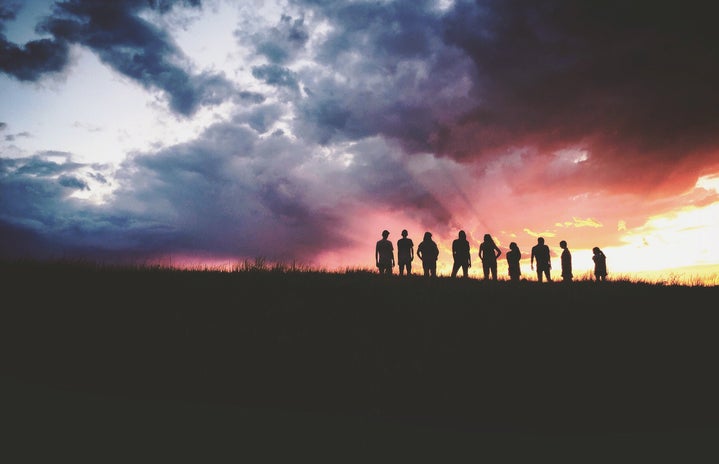I’ve had my fair share of friendship breakups, and if there’s anything I’ve learned, it’s that friendship breakups hurt more than actual breakups. Most of the time, it was me doing the breaking up. Nevertheless, I don’t regret the decisions I’ve made. I’m the kind of person who knows that if something is dragging me down, I have to do something to change it. Especially if that means walking away from someone who is no longer bringing happiness into my life.
My standards for friends aren’t exactly high. I just want someone who’s going to be there for me no matter what. To me, the most important thing that a friend can do for you is to be there for you when you need them the most. A good friend lifts you up and makes you feel good about yourself. They are kind, caring, and are always willing to listen to you whenever you’re having a problem, and they would help you by all means. That’s what a true friend does in my eyes.
The way I handle things with people is by cutting them off when our friendship becomes toxic. In the past, I’ve expected things to go like this: I’ll text the person about a problem that I’m having with them, they’ll own up to what they did wrong and apologize for it, and then we’ll move on with our lives. However, it’s actually gone like this: I text the person about a problem I’m having with them and they get defensive and turn the situation around on me by bringing up all the mistakes that I’ve made in the past. Somehow, I’m always the one who ends up looking like the bad guy.
When it gets to that point, I decide that the friendship isn’t worth saving. Why am I going to waste my time trying to make someone see things from my point of view when they’re just going to act like a victim? I mean, I know I’m not perfect. In fact, I’m just as guilty in doing damage to my previous friendships as the other person. Nonetheless, at least I own up to whatever I did wrong and apologize for it.
Back at the beginning of my junior year of high school, one of my former friends had told me about a problem that she was having with a girl who I had just stopped being friends with. She told me that this girl was texting her and complaining to her about not feeling pretty enough because she was overweight. My friend felt awkward because she didn’t know what to say.
At the time, I’d laughed and said something like, “Well that is awkward because she is overweight. You can’t just deny that she is to make her feel better.”
The next day, my friend hardly spoke to me whenever I tried to talk to her in class and at volleyball practice after school, and I got upset because I didn’t know why she wasn’t talking to me.
Later that night, she texted me saying, “Hey, I’m sorry that I didn’t talk to you all day, I didn’t think you’d get that upset over it.”
I was angry, and I wanted to know why she had been ignoring me for no reason. She proceeded to tell me that the reason why was because she was annoyed about what I’d said about the overweight girl, and her not talking to me was her way of “punishing” me. She said that just because this girl and I weren’t friends anymore, that didn’t give me the right to make fun of something that she couldn’t control. Even though my friend had gone about addressing the issue in an extremely immature way, she did make me realize that what I did was wrong, and I apologized for it.
I’m not claiming to be a saint who never does anything wrong. Sometimes I don’t go about handling my falling-outs in the right way. Whenever I’ve ended a friendship, if I see the girl in person afterward, I’ll avoid them at all costs. I won’t acknowledge their presence by avoiding eye contact with them and acting like I don’t see them walking towards me by looking down at my phone (granted, sometimes I’ll legitimately be that tuned into my phone if you see me in public, because I’m super oblivious to everything while walking around). I don’t do well with confrontation when it comes to dealing with people and I just want to avoid an awkward run-in. It’s something that I’m trying to work on because it is childish.
However, the one thing that I absolutely cannot stand is when someone accuses me of doing something that never happened or isn’t true. It’s happened quite a bit actually, and I’ve had several instances where people have called me “fake” and have said that I was never a true friend to them. Let me make something clear: I would never in a million years pretend to be someone’s friend. Anyone who truly knows me knows that I would never do something like that, because what’s the point? It’s too much work to pretend. When I genuinely love having your presence in my life, you’ll know. The same goes for when I no longer enjoy your company.
Moreover, I may be completely biased by saying this, but I am the truest person I know. There is nothing I wouldn’t do for my friends, and I’m always there to lend a helping hand. I’ve sat with people for hours, listening to them vent about their family lives, bad habits, and other personal problems. I’ve seen people at their worst points, and my heart always breaks for them. I try to offer the best advice I can because I hate to see them suffering. Yet when they continue to hurt themselves by not changing their unhealthy coping mechanisms, I can’t stay and watch them destroy themselves. It’s too much for me, and it’s really insulting when I’ve gone through hell and back with some of my previous friends, only for them to turn around and tell me that I judge them behind closed doors.
I didn’t write this piece to target anyone specifically. This article simply highlights some of the struggles with friends that I’ve personally dealt with in the past. I believe that everything happens for a reason, and people come into our lives to teach us something. I would like to conclude my piece by saying this: don’t feel bad for ending a friendship that isn’t fulfilling you. Yes, you may feel like crap for walking away, but sometimes leaving is easier than staying. Sometimes, you have to put your own wellbeing before someone else’s. I don’t feel bad about myself for doing that, because at the end of the day, you have to be a friend to yourself first before you can be a friend to someone else.

